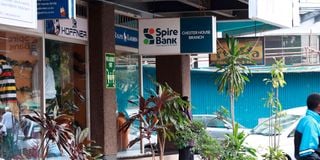Premium
House team now queries Spire Bank sale deal

Spire Bank branch on Koinange Street in Nairobi on May 29, 2020. The National Assembly’s Finance and Planning committee has questioned the planned acquisition of the loss-making Spire Bank by rival lender Equity Bank, warning that it could hurt teachers’ investments.
The National Assembly’s Finance and Planning committee has questioned the planned acquisition of the loss-making Spire Bank by rival lender Equity Bank, warning that it could hurt teachers’ investments.
The acquisition, which is in its final stages, will see Mwalimu Sacco Limited, which owns Spire Bank, pay Equity Bank Sh422 million for its deposits and loan book which has been discounted at 13 per cent—an issue questioned by members of the Parliamentary committee since the debt is secured.
Secured loans have collateral, including physical assets such as property and vehicles or liquid assets such as cash.
In the transaction, Equity will acquire approximately 20,000 customers of Spire Bank holding deposits of approximately Sh1.3 billion. In addition, Equity Bank will acquire approximately 3,700 loan customers of Spire Bank that have outstanding loan balances of about Sh945 million.
Molo MP Kimani Kuria, who chairs the committee, said the deal endangers teachers’ investments in Mwalimu Sacco.
“What concerns this committee is that these are teachers’ money being lined up to pay Equity so that it can partially take over this bank. We will be seeking better explanations from the Central Bank of Kenya (CBK),” said Mr Kuria.
“We will also seek to know why the loans have been discounted at 13 per cent yet they are secured,” the Molo MP added.
Mr Kuria spoke after the committee held a session with Mwalimu Sacco, the management of Spire Bank, the Capital Markets Authority and the Kenya Bankers Association (KBA) over the planned acquisition of Spire by Equity Bank.
Investigation
The committee wants Ernest and Young, the financial experts that advised Mwalimu Sacco to buy Spire Bank in 2016, to be investigated by relevant government agencies.
“This committee should recommend serious investigations of those who were involved in the acquisition of the bank by Mwalimu Sacco including the transactional advisers,” said Ainamoi MP Benjamin Lang’at, the vice chair of the committee.
Kitui Rural MP David Mboni, a member of the committee, disclosed that CBK has released Sh1.7 billion to the transactional advisers overseeing the sale of Spire to Equity Bank.
On Tuesday, Mwalimu Sacco chairman Joel Gachari told the committee: “It has been difficult for us to convince the teachers to continue supporting the bank.”
This prompted Mr Kuria to seek to know if due diligence was undertaken before Mwalimu Sacco acquired the bank and whether teachers were consulted.
In 2016, Mwalimu Sacco, which has over 1,000 members, who are mostly teachers, bought Spire Bank from the late businessman Naushad Merali at Sh2.6 billion.
Mwalimu Sacco went on to own 99.2 per cent shareholding of the bank, with the 0.8 per cent controlled by Mr Merali and others.
The committee heard yesterday that after the teachers acquired the bank, Mr Merali immediately withdrew Sh1.7 billion in deposits from the bank, which signalled the start of the bank’s financial woes.
This has seen teachers lose over Sh13 billion in savings from the Sacco to help it stay afloat to no avail, leaving them with no alternative but to sell the bank.
As per its audited financial statements for the year ending December 31, 2020, the Sacco had an asset base of Sh57.7 billion, which is largely members’ subscription fees.
A report of the committee in the 12th parliament recommended that the Ethics and Anti-Corruption Commission and the Directorate of Criminal Investigations establish if the acquisition of the bank by Mwalimu Sacco was marred by fraud.
Spire Bank Limited, formerly Equatorial Commercial Bank (ECB), was established as a finance company in 1983 under the Banking Act.
It was regulated by the Central Bank of Kenya as a financial institution.
On October 10, 2014, Mwalimu National Sacco Society Limited signed an agreement to buy the banking and investment arm of the ECB, which rebranded as Spire Bank.
The acquisition was finalised in 2016 despite public concern about the risk of investing the teachers’ savings in the financially troubled ECB that had just posted a pre-tax loss of Sh326.4 million in the year ending December 31, 2014.





